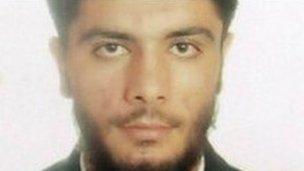Terror suspect extradited to US
- Published

A man accused of leading an al-Qaeda plot to set off bombs in Manchester has been extradited to the US.
Abid Naseer has been described by a High Court judge as an "al-Qaeda operative" who "poses a serious threat to the national security of the UK".
UK prosecutors said there was not enough evidence to charge him.
However, the US wants to put him on trial, arguing the Manchester plot was part of a wider conspiracy to also bomb New York.
In December his bid to stop the extradition was thrown out of the European Court of Human Rights, where his lawyers had argued he could be tortured if returned to Pakistan from the US.
Mr Naseer was arrested on 8 April 2009 along with 11 other mainly-Pakistani nationals in counter-terrorism raids in Manchester and Liverpool but no-one has been charged by British prosecutors.
Four police forces carried out the dramatic raids in daylight and Prime Minister Gordon Brown was quoted as saying "we are dealing with a very big terrorist plot".
'Sinister message'
Eleven of the arrested men were Pakistanis, most of whom came to the UK as students. The intelligence services suspected they were part of an international al-Qaeda plot directed from Pakistan and Abid Naseer was said to be the leader of the British end of the operation.
Suspicions were first aroused because of intercepted email exchanges between Mr Naseer and an al-Qaeda suspect in Pakistan known as "Ahmad".
Police made their arrests after an email about a Nikkah (Islamic wedding ceremony) which was believed to have been code for the attack. It read "I met with Nadia family and we both parties have agreed to conduct the Nikkah after 15th and before 20th of this month."
Mr Naseer maintains that he was looking for a wife, but a High Court hearing dismissed his explanation, saying "we are sure that email conveyed a sinister and alarming message".
The judge concluded Mr Naseer was "an al-Qaeda operative who posed and still poses a serious threat to the national security of the United Kingdom" but that he could not be deported to Pakistan because there was a risk he would be tortured by the intelligence services there.
The British authorities were now faced with a serious dilemma. The police and MI5, supported by a High Court judge, viewed Mr Naseer as a danger to national security but the CPS found there was insufficient evidence to prosecute him and the courts had ruled he could not be deported.
A potential breakthrough was made in July 2010 when the FBI announced it had charged Mr Naseer and wanted to try him in New York. They allege he was part of an international terror plot which also included a thwarted suicide attack on the city's subway.
Mr Naseer was charged with providing material support for a foreign terrorist organisation and conspiracy to use a firearm. David Kris, Assistant Attorney General for National Security, said: "these charges underscore the global nature of the terrorist threat we face."
Inconsistencies
But questions remain as to why a man accused of plotting to blow up targets in central Manchester will be tried in America. The public statements of prosecutors on both sides of the Atlantic also contain some inconsistencies.
A US Justice Department press release in July 2010 stated that the "UK authorities conducted searches of the plotters' homes, where they found large quantities of flour and oil, as well as surveillance photographs of public areas in Manchester and maps of Manchester's city centre posted on the wall, with one of the locations from the surveillance photographs highlighted".
Yet the High Court ruling spoke of the "complete absence of any evidence of the handling or preparation of explosives by Naseer and his alleged associate." Despite searches of buildings "nothing was found, apart from an irrelevant trace of RDX in one of the properties".
Though the police and MI5 believed the photos of the men posing around central Manchester was evidence of reconnaissance, the CPS concluded there was no realistic prospect of conviction.
A Home Office spokesperson said: "We can confirm that today Abid Naseer was extradited to America where he is accused of terrorism offences. His case is now a matter for the US authorities."
The removal of Mr Naseer follows three months after Abu Hamza al-Masri, Babar Ahmad and three other terrorism suspects were finally extradited to the US after years of legal wrangling.
They will stand trial later this year. If convicted, Mr Naseer faces a possible life sentence in a supermax prison.
Mr Naseer is the eighth defendant to face charges in Brooklyn federal court related to the al-Qaeda plot.
Najibullah Zazi and Zarein Ahmedzay were jailed in 2010 after admitting their role in the foiled plot. They subsequently gave evidence against a Bosnian-born US citizen, Adis Medunjanin, who was jailed for life in November.
US prosecutors claim that, at the culmination of the plot in April 2009, Mr Naseer used coded language to tell al-Qaeda associates he was ready to carry out the attack on the New York subway. Mr Naseer said he was planning a large "wedding" for many guests between 15 and 20 April 2009.
Last year Zazi, Ahmedzay and a third turncoat, Bryant Neal Vinas, gave evidence in a Norwegian court which led to three other al-Qaeda suspects being convicted of plotting a similar terrorist attack in Denmark.
New York Police Commissioner Raymond Kelly said, "New York and London, and now Manchester, share a history of terrorism and outstanding law enforcement cooperation in bringing those allegedly responsible to justice, as this case illustrates. Al-Qaeda has attacked on both sides of the Atlantic, and it has been brought to justice on both shores too."
Naseer is due to appear before a court in New York on Monday.
- Published3 January 2013
- Published21 April 2012
- Published17 November 2012